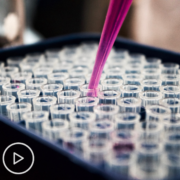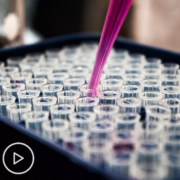CLL Genetic Testing Explained
CLL Genetic Testing Explained from Patient Empowerment Network on Vimeo.
Genetic testing results can impact a chronic lymphocytic leukemia (CLL) patient’s treatment options and prognosis, but these tests are different from the “hereditary” tests you hear about. Learn about the types of testing available, how the information is used to guide treatment decisions and clear steps to empower you to work with your healthcare team to access personalized care. Want to Learn More? Download the CLL Genetic Testing Resource Guide here.
See More From Your CLL Navigator
Related Resources

CLL Genetic Tests: How Do Results Impact Treatment and Care? |

|

|
Transcript:
CLL Genetic Testing Explained
Chronic lymphocytic leukemia, also known as CLL, is a type of blood cancer that occurs when the bone marrow makes too many abnormal or cancerous lymphocytes. It is the most prevalent type of leukemia in adults. Some forms of CLL are slow growing and may not require treatment immediately, if at all. Patients with CLL are monitored closely to determine when, or if, they will need treatment.
How Can You Learn More About Your CLL?
Genetic tests can provide more detail about your specific disease. By using laboratory approaches to identify changes in chromosomes, genes or proteins occurring in your CLL cells, the results can assist your healthcare team in providing better overall care. These tests do not look for genetic changes you inherit or that you pass on to family members. A gene mutation is an abnormal change in a gene’s DNA sequence.
Identifying mutations and changes in chromosomes can help determine:
- Whether a patient needs closer follow up.
- A patient’s prognosis and outcome.
- And the best treatment for that individual person.
The types of genetic tests that physicians use for patients with CLL include:
- Fluorescence in situ Hybridization, or a FISH Test, which is used to identify specific genes or chromosome changes. This type of test is essential before beginning a treatment regimen.
- Molecular testing identifies specific gene variations or mutations. Types of Molecular tests include:
- Polymerase chain reaction, PCR for short
- DNA Sequencing
- and Next-Generation Sequencing
Your healthcare team can determine which type of tests are appropriate for you.
Mutations associated with CLL include:
- Notch1 mutation
- TP53 mutation
- and SF3B1 mutation
Your healthcare team will look for the following changes in chromosomes using the FISH test:
- Deletion 13q
- Trisomy 12
- Deletion 11q
- and Deletion 17p
Patients with Deletion 17p do not respond well to chemotherapy. These patients have a better response to oral targeted agents and should strongly consider a clinical trial for treatment. Prior to treatment, your healthcare team should check for the IGHV mutation. This mutation in CLL patients is a favorable finding, and indicates that the patient may have a slower growing cancer that is easier to treat. Watch and wait, also known as active surveillance, is the period of time before treatment begins in which a patient is monitored closely. When the disease progresses or symptoms occur, your healthcare team will begin treatment.
When it’s time to treat, there a number of approved CLL treatment options Including:
- Oral targeted therapy
- Clinical trials
- Monoclonal antibody therapy
- Chemotherapy in combination with a monoclonal antibody
- And stem cell transplant
How Can You Take Action?
- Make sure you see a CLL specialist.
- Discuss which tests you should undergo with your doctor.
- Review the results with your doctor.
- Do your own research on the findings.
- Work with your healthcare team to determine a personalized treatment plan for Your CLL.
- Ask your doctor when you should be re-tested.








